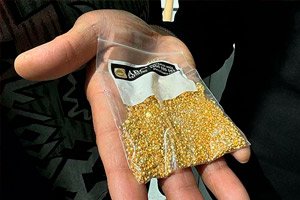
All iLive content is medically reviewed or fact checked to ensure as much factual accuracy as possible.
We have strict sourcing guidelines and only link to reputable media sites, academic research institutions and, whenever possible, medically peer reviewed studies. Note that the numbers in parentheses ([1], [2], etc.) are clickable links to these studies.
If you feel that any of our content is inaccurate, out-of-date, or otherwise questionable, please select it and press Ctrl + Enter.
Gold proved more effective than platinum for chemoprevention in new lab study
Last reviewed: 03.07.2025

A study by scientists from Australia and India has found that a new gold-based drug can slow tumor growth in animals by 82% and target cancer more selectively than standard chemotherapy drugs. The results are published in the European Journal of Medicinal Chemistry.
Breakthrough in cancer treatment
A new gold-based compound created by researchers at RMIT University has been found to be:
- 27 times more effective against cervical cancer cells in the laboratory than the drug cisplatin.
- 3.5 times more effective against prostate cancer.
- 7.5 times more effective against fibrosarcoma.
In mouse studies, the compound reduced cervical tumor growth by 82%, while cisplatin showed only a 29% reduction.
Benefits of the new approach
The gold-based compound (Gold(I)) was specifically designed to interact with the enzyme thioredoxin reductase, which is found in large quantities in cancer cells. By blocking this protein, the compound prevents cancer cells from multiplying and developing resistance to drugs.
Main advantages:
- Selective action: The drug has minimal impact on healthy cells, reducing the toxicity typical of standard drugs such as cisplatin.
- Stability: The compound remains stable as long as it reaches the tumor.
- Double effect: Studies on zebra fish have shown that the drug also stops the formation of new blood vessels needed for tumor growth (antiangiogenesis).
Combating drug resistance
The drug has demonstrated high efficacy against ovarian cancer cells, which often develop resistance to cisplatin. This discovery is an important step towards treating recurrent and metastatic forms of cancer.
International cooperation
The research was conducted in collaboration with scientists from the Indian Institute of Chemical Technology (IICT). This collaboration brought together cutting-edge scientific approaches and infrastructure from Australia and India.
Professor Suresh Bhargava, the project leader, noted that gold, which is widely used in Ayurvedic medicine, is gaining increasing acceptance in oncology due to its biocompatibility.
"Gold has been used for centuries to treat various diseases, but its properties have not been well studied scientifically. Our work helps fill this gap and create new molecules that enhance the healing properties of gold," Bhargava said.
Support for the industry
The research is supported by gold mining companies including Agnico Eagle Mines and Pallion, the latter of which provides 250 grams of pure Australian gold annually for scientific research.
Professor Bhargava stressed that these initiatives highlight the social and scientific importance of the RMIT team's work, which is bringing humanity closer to new solutions in cancer treatment.
